Hunting in New Hampshire is an exciting outdoor activity that many locals and tourists from across the nation come to experience. With its varied terrain, ranging from lush forests to towering mountains, there’s a perfect habitat for different game species. Depending on the type of game and method used, hunting season normally begins in autumn and lasts until wintertime.
If you’re looking for big-game action, then New Hampshire has what you need. White-tailed deer, moose, and black bears are all available during this time period with bow season starting up in September before firearms open around November – making it ideal for avid hunters everywhere!
In this comprehensive guide, we have covered all you need to know about hunting in New Hampshire. You will learn what type of animals you can hunt here, places to hunt them, hunting license information, and hunting seasons.
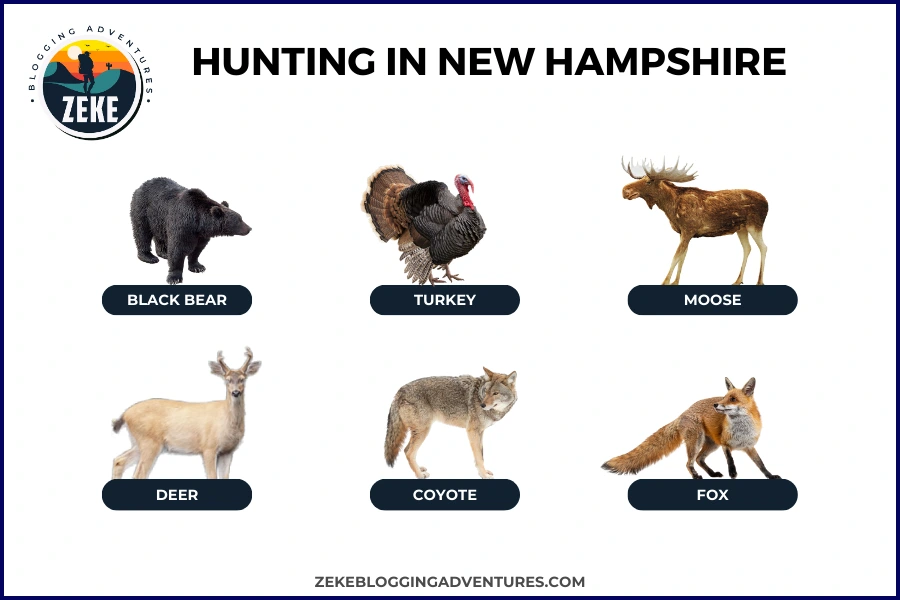
What Can You Hunt in New Hampshire?
Hunting in The Granite State is an incredible experience. From the majestic white-tailed deer to wild turkeys, there are plenty of game species available for a thrilling hunt. Springtime brings out the best in these animals as they become more active and challenging to catch.
Waterfowl such as ducks and geese inhabit lakes and wetlands, making them accessible targets during their designated seasons with proper permits. Black bear hunting also offers an adrenaline-filled adventure.
Also, small game like rabbits, squirrels, or grouse can be hunted year-round with necessary licenses for a fun but relaxed outing.
Deer
New Hampshire is a haven for two species of deer: white-tailed and moose. The former can be found all over the state, while the latter typically sticks to more northern regions. Both animals are highly sought after by hunters due to their delicious meat and majestic antlers.
The population of white-tailed deer in New Hampshire has increased significantly thanks to conservation efforts and responsible hunting practices – making it an ideal spot for those looking to bag a buck or doe during different seasons.
With its range of terrain from dense forests, to open fields, hunters must be prepared for any environment they come across if they want success on the hunt.
It’s important that you always adhere to safety regulations set out by the state when chasing game here so make sure you have your permits squared away before heading out into nature.
Deer Season in New Hampshire
| Season | Dates | WMUs |
| Archery | 15 Sep – 08 Dec | A |
| Archery | 15 Sep – 15 Dec | B – M |
| Muzzleloader | 28 Oct – 07 Nov | A, B, C1, C2, D1, D2E, E, F, G2, I2 |
| Muzzleloader | 28 Oct – 07 Nov | I1, H1, J1, K, D2W, H2, J2, G1, L, M |
| Firearms | 08 Nov – 26 Nov | A |
| Firearms | 08 Nov – 03 Dec | B, C1, C2, D1, D2E, E, F, G2, I1, I2 |
| Firearms | 08 Nov – 03 Dec | J1, H1, H2, J2, K, D2W, G1, L, M |
| Youth Hunt | Oct 21 – Oct 22 | Statewide |
| Deer Baiting | 18 Oct – 15 Nov | A – L |
| Deer Baiting | 15 Sep – 15 Dec | M |
Moose
Moose hunting in New Hampshire is a highly sought-after experience, so make sure to plan ahead and apply for your permit early. There are two seasons of opportunity – archery season runs in late September while firearm season takes place mid-October through mid-November.
For the best chances of success, scout out areas with dense vegetation near water sources like streams or lakes where moose tend to graze on aquatic plants and shrubs.
Be sure you have all the necessary gear including a high-powered rifle equipped with scope as well as plenty of ammunition – these majestic animals can be quite resilient! Once you’ve made your harvest, follow Fish & Game regulations for field dressing and transport it home safely.
Moose Season
| Season | Dates | Notes |
| Moose | Oct 21 – Oct 29 | Permit Required. |
Black Bear
Scoping out black bears in New Hampshire is key for any successful hunt. These animals have vast territories and can often be found in the northern parts of the state, while lower populations linger around central and southern regions. The White Mountains region and Connecticut River Valley are prime spots to search for them.
To bait these animals successfully requires some know-how: they’ve got a sweet tooth, so sugary donuts or honeyed bread will draw ’em from miles away! But make sure you abide by all local regulations when it comes to baiting – scent control measures are essential as well.
When it’s time to take aim, remember that black bears have thick hides and strong bones – only a high-powered rifle or bow with sharp broadheads can guarantee an effective kill shot.
Safety should always come first though; although typically nonaggressive towards humans, their behavior can be unpredictable at times, so the bear spray is a must.
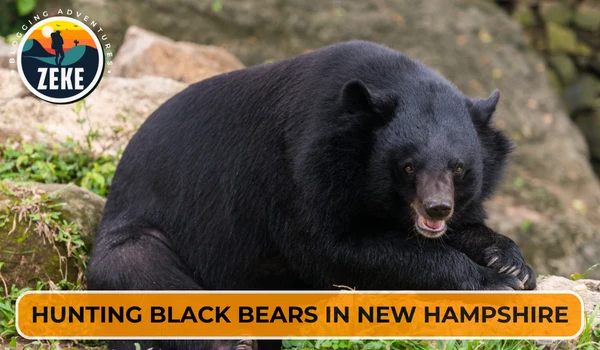
Black Bear Season
| Season | Dates | WMUs |
| General Season | 01 Sep – 07 Nov | A, B, C2, D1, H1, H2, I2, K |
| General Season | 01 Sep – 30 Nov | C1, D2, E, F, G, I1, J1, J2, L, M |
| Baiting Season | 01 Sep – 28 Sep | A, B, C2, D1, H1, H2, I2, K, L, M |
| Baiting Season | 01 Sep – 05 Oct | C1, D2, E, F, G, I1, J1, J2 |
| Dog Season | 18 Sep – 07 Nov | A, B, C1, C2, D1, D2, E, F, H1, I1, I2, J1, J2, G |
| Dog Season | Closed | H2, K, L, M |
Turkey
Hunting wild turkeys in New Hampshire is a thrilling challenge that demands skill and luck. With successful conservation efforts, these majestic birds can be found across the state – from White Mountain forests to Monadnock hills.
To increase your chances of success while hunting in New Hampshire, you must master turkey calls like box or mouth calls to imitate their natural sounds and behaviors – luring them into your hunting area.
Knowing where they roost and feed will give you even more of an advantage when planning your hunt. Turkeys are adaptable creatures so they can be found in a variety of habitats including fields, woodlands, and even some suburban areas.
Wild Turkey Season
| Season | Dates | WMUs |
| Fall Archery | Sep 15 – Dec 08 | A |
| Fall Archery | Sep 15 – Dec 15 | B – M |
| Fall Shotgun | Oct 16 – Oct 22 | D2 – M |
| Spring Turkey | May 01 – May 31 | H1, H2, I1, J2, K, L, M |
| Youth Hunt | Apr 29 – Apr 30 | H1, H2, J2, K, L, M |
Coyote
Coyotes may be mistaken for wolves or large dogs, but they have unique characteristics that set them apart. Sporting a slender body and bushy tail with pointed ears, their fur camouflage is impeccable – ranging from grayish-brown to reddish-brown in color. But what gives it away? Their piercing yellow eyes never miss a thing.
If you want to spot one of these bad boys, knowing their behavior and habitat will give you the advantage. Look out for tracks, droppings, and dens which are all indicators of where they like to hang out. Plus coyotes are most active at dawn/dusk so plan your hunt accordingly if you’re serious about finding one.
Luring coyotes in can be tricky but using distress calls (like rabbit or fawn) should do the trick as they mimic injured prey; this usually attracts curious coyotes who are on the lookout for an easy meal.
Or if that doesn’t work, then try decoys such as wounded animals or even another coyote nearby – anything to pique their interest works here!
Coyote Season
| Season | Dates | Bag Limit |
| Coyote | Jan 01 – Dec 31 | No Limit |
| Night Hunting only | Jan 01 – Mar 31 | No Limit |
Fox
Chasing a fox through the forests and hills of New Hampshire is an exhilarating experience. Foxes are renowned for their quickness and agility, making them a difficult prey to catch.
They can reach speeds up to 45 miles per hour so being properly equipped with the right techniques and gear helps increase your chances of success.
New Hampshire offers diverse terrain perfect for hunting from open fields to woodlands. This variety allows you to choose which approach works best; be it stalking or using hounds as tracking aids, there’s no shortage of excitement in this pursuit.
Before beginning your hunt, however, make sure that you have obtained all necessary licenses and permits required by state regulations.
In addition to having proper equipment such as rifles or shotguns, wearing camouflage clothing is essential when trying not to get noticed by your target but also other hunters around you should remember safety comes first: wear bright orange clothing so others can see where you are easily.
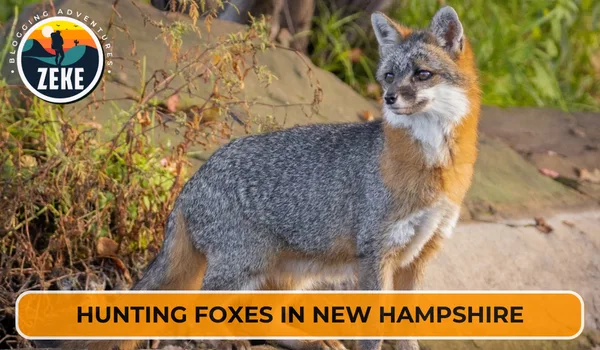
Fox Season
| Species | Dates | Bag Limit |
| Gray & Red Fox | Sep 01 – Mar 31 | No Limit |
Rabbit Season
| Season | Dates | Bag Limit |
| Cottontail Rabbit (WMU H2, K, L, M) | Oct 01 – Jan 31 | 2 per day |
| Cottontail Rabbit Falconry | Oct 01 – Mar 15 | 2 per day |
| Snowshoe Hare (WMU A-G, J-1) | Oct 01 – Mar 31 | 3 per day |
| Snowshoe Hare (WMU H1, H2, I1, I2, J2, K, L, M) | Oct 01 – Mar 31 | 2 per day |
Squirrel Season
| Species | Dates | Bag Limit |
| Gray Squirrel | Sep 01 – Jan 31 | 5 per day |
Pheasant Season
| Species | Dates | Bag Limit |
| Ring-necked Pheasant | Oct 01 – Dec 31 | 2 per day |
Quail Season
| Species | Dates | Bag Limit |
| Bobwhite Quail | Oct 01 – Dec 31 | 4 per day |
Chukar Season
| Species | Dates | Bag Limit |
| Chukar, Hungarian Partridge | Oct 01 – Dec 31 | 4 per day |
Grouse Season
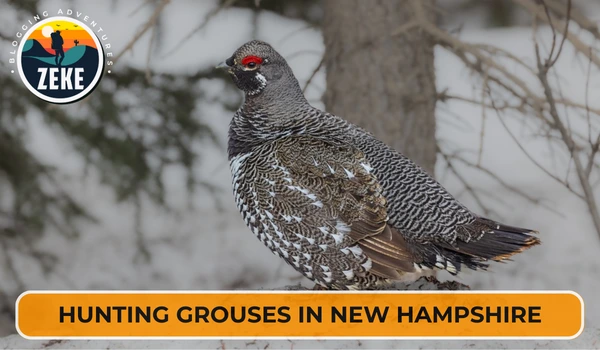
| Species | Dates | Bag Limit |
| Ruffed Grouse | Oct 01 – Dec 31 | 4 per day |
Bobcat Season
| Species | Dates | Bag Limit |
| Bobcat | Closed Season | Closed Season |
Raccoon Season
| Species | Dates | Bag Limit |
| Raccoon | Sep 01 – Mar 31 | No Limit |
Opossum Season
| Species | Dates | Bag Limit |
| Opossum | Sep 01 – Mar 31 | No Limit |
Skunk Season
| Species | Dates | Bag Limit |
| Skunk | Sep 01 – Mar 31 | No Limit |
Fisher Season
| Season | Dates | Bag Limit |
| Trapping | Dec 01 – Dec 31 | 2 per season |
| Firearm/Archery | Dec 01 – Jan 31 | 2 per season |
Mink Season
| Season | Dates | Bag Limit |
| WMU A – F | Oct 15 – Apr 10 | No Limit |
| WMU G – M | Nov 01 – Apr 10 | No Limit |
Muskrat Season
| Season | Dates | Bag Limit |
| WMU A – F | Oct 15 – Apr 10 | No Limit |
| WMU G – M | Nov 01 – Apr 10 | No Limit |
Weasel Season
| Season | Dates | Bag Limit |
| WMU A – F | Oct 15 – Apr 10 | No Limit |
| WMU G – M | Nov 01 – Apr 10 | No Limit |
Otter Season
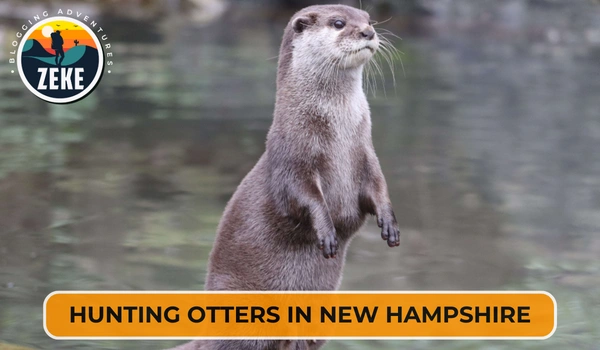
| Season | Dates | Bag Limit |
| Trapping Only | Oct 15 – Apr 10 | 10 |
Beaver Season
| Season | Dates | Bag Limit |
| Trapping Only (WMU A – F) | Oct 15 – Apr 10 | No Limit |
Crow Season
| Season | Dates | Bag Limit |
| Northern Zone | Aug 15 – Nov 30, Mar 16 – Mar 31 | No Limit |
| Inland & CT River Zone | Aug 15 – Nov 30, Mar 16 – Mar 31 | No Limit |
| Coastal Zone | Aug 15 – Nov 30, Mar 16 – Mar 31 | No Limit |
Snipe Season
| Season | Dates | Bag Limit |
| Northern Zone | Sep 15 – Nov 14 | 8 per day |
| Inland & CT River Zone | Sep 15 – Nov 14 | 8 per day |
| Coastal Zone | Sep 15 – Nov 14 | 8 per day |
Woodcock Season
| Season | Dates | Bag Limit |
| Northern Zone | Oct 01 – Nov 14 | 3 per day |
| Inland & CT River Zone | Oct 01 – Nov 14 | 3 per day |
| Coastal Zone | Oct 01 – Nov 14 | 3 per day |
Duck Season
| Season | Dates | Bag Limit |
| Northern Zone | Oct 02 – Nov 30 | 6 per day |
| Inland & CT River Zone | Oct 05 – Nov 03, Nov 22 – Dec 21 | 6 per day |
| Coastal Zone | Oct 04 – Oct 10, Nov 22 – Jan 13 | 6 per day |
| Sea Ducks Northern Zone | Oct 02 – Nov 30 | 4 per day |
| Sea Ducks Northern Zone | Oct 05 – Nov 03, Nov 22 – Dec 21 | 4 per day |
| Sea Ducks Coastal Zone | Oct 04 – Oct 10, Nov 22 – Jan 13 | 4 per day |
Goose Season
| Season | Dates | Bag Limit |
| Canada Geese (Sep) | Sep 01 – Sep 25 | 5 per day |
| Canada Geese Northern Zone | Oct 02 – Nov 30 | 2 per day |
| Canada Geese Inland & CT River Zone | Oct 05 – Nov 03, Nov 22 – Dec 21 | 2 per day |
| Canada Geese Coastal Zone | Oct 04 – Oct 10, Nov 22 – Jan 13 | 2 per day |
| Snow Geese Northern Zone | Oct 02 – Nov 30 | 25 per day |
| Snow Geese Inland & CT River Zone | Oct 05 – Dec 21 | 25 per day |
| Snow Geese Coastal Zone | Oct 04 – Jan 13 | 25 per day |
Merganser Season
| Season | Dates | Bag Limit |
| Northern Zone | Oct 02 – Nov 30 | 5 per day |
| Inland & CT River Zone | Oct 05 – Nov 03, Nov 22 – Dec 21 | 5 per day |
| Coastal Zone | Oct 04 – Oct 10, Nov 22 – Jan 13 | 5 per day |
Coot Season
| Season | Dates | Bag Limit |
| Northern Zone | Oct 02 – Nov 30 | 6 per day |
| Inland & CT River Zone | Oct 05 – Nov 03, Nov 22 – Dec 21 | 6 per day |
| Coastal Zone | Oct 05 – Nov 03, Nov 22 – Dec 21 | 6 per day |
Brant Season
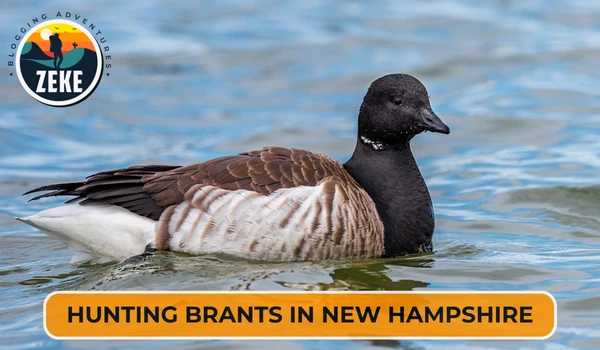
| Season | Dates | Bag Limit |
| Northern Zone | Oct 02 – Oct 31 | 1 per day |
| Inland & CT River Zone | Oct 05 – Nov 03 | 1 per day |
| Coastal Zone | Oct 04 – Oct 10, Nov 22 – Dec 14 | 1 per day |
Falconry Season
| Season | Dates | Bag Limit |
| Northern Zone | Dec 01 – Jan 14 | 3 per day |
| Inland & CT River Zone | Nov 04 – Nov 21, Dec 22 – Jan 17 | 3 per day |
| Coastal Zone | Jan 26 – Mar 10 | 3 per day |
Youth Waterfowl Season
| Season | Dates |
| Northern Zone | Sep 23 – Sep 24 |
| Inland & CT River Zone | Sep 23 – Sep 24 |
| Coastal Zone | Sep 23 – Sep 24 |
New Hampshire Hunting License Information
If you are a hunter living in New Hampshire, you must have a valid license. Thankfully, getting one is easy; whether online or at an authorized agent or NH Fish and Game office.
For residents aged 16-68, the basic hunting license gives access to small game such as upland birds and waterfowl plus turkey. If big game like deer or bear tickles your fancy, then additional tags must be purchased separately.
Residents over 68 can benefit from free lifetime hunting licenses. Non-residents have different choices depending on the age and type of animal they want to hunt: either non-resident small game only permits Or bigger packages including both small & big games!
Don’t forget though that everyone needs to complete the mandatory hunter education course before obtaining their licenses (unless accompanied by someone with an already existing certificate). This covers all safety measures as well as important topics such as wildlife conservation and ethics.
Special permits for certain animals may also be required e.g. moose/pheasant etc. which can be bought online or offline via any licensed agent/NH Fish and Game website respectively.
A resident hunting license costs $32 while a non-resident hunting license costs $113 in New Hampshire.
Where Can You Hunt in New Hampshire?
The White Mountain National Forest is an ideal destination for deer, moose, bear, and small game hunters. With over 750,000 acres of pristine wilderness teeming with wildlife opportunities – this spot is not to be missed.
For those seeking more of a challenge – the Great North Woods region offers some of the best untamed lands in the state with plenty of moose and black bears calling it home; along with ample grouse and woodcock habitats.
Watersport fanatics should journey to Lakes Region which boasts 250 lakes and ponds for duck or goose hunting adventures. Those who prefer the upland game can explore southern NH’s rolling hills and farmlands that are the perfect habitat for pheasants, quail & other birds.
Plus many local landowners offer access through their Landowner Hunting Permit Program. So don’t miss out on hunting in New Hampshire!
Public Hunting Places in New Hampshire
White Mountain National Forest
From white-tailed deer to black bears, moose to wild turkeys, the White Mountain National Forest offers something for all types of hunters. Whether it’s big game or small game that you’re after, this majestic landscape has plenty of possibilities.
With its 800 thousand acres of rugged terrain including mountains and dense forests, you’ll be able to stalk your prey with ease. And don’t forget about the breathtaking views.
For those seeking an additional challenge in their hunt, bowhunting is allowed in this forest as well. The thick vegetation and steep slopes make it a bit more challenging than rifle hunting, but if you use your skills wisely and stay patient enough until the animal appears within range, then success could be yours.
Great Bay National Wildlife Refuge
Situated along the New Hampshire coast, Great Bay National Wildlife Refuge offers a unique landscape of salt marshes, tidal creeks, forests, and grasslands making it an ideal habitat for many species of game. From deer hunting to waterfowl or upland birds; this refuge has something for everyone.
Deer hunters will be delighted with over 1,000 acres designated specifically for their pursuit. Strict management practices are in place to ensure sustainable populations and healthy herds guaranteeing every hunter an ethical and enjoyable experience.
If you’re more into waterfowl hunting, then look no further: you can find prime locations along the extensive coastline attracting different varieties during migration season from puddle ducks all the way up to diving ducks! Set up blinds or take advantage of available natural cover throughout the area.
Upland bird hunters also get some love here at Great Bay NWR as they provide a great mix of grasslands & shrubland suitable for pheasants, quail & grouse alike. The refuge welcomes both walk-in hunts as well as designated areas set aside just for dog training purposes.
Pawtuckaway State Park
Located in the heart of New Hampshire, Pawtuckaway State Park offers over 5,000 acres of picturesque terrain – ideal for wildlife hunting. From white-tailed deer to black bears and turkey to small game like rabbits and squirrels, this park has something for everyone.
Deer hunting is one of the most popular activities here at Pawtuckaway with a healthy population of white-tails providing an exciting yet rewarding hunt. Whether you’re looking to go bow or gun hunting, there are plenty of opportunities available; making it a great place for both experienced hunters as well as those just starting out.
If you’re after something more unique, then why not try your hand at black bear hunting? The state park maintains strict regulations ensuring sustainable harvests so be sure to follow these before setting off on your adventure.
And don’t forget about small game too; dense forests and open fields provide perfect conditions for tracking down rabbits or squirrels which is perfect if you’re bringing along family or introducing kids into the sport.
Umbagog National Wildlife Refuge
Nestled in the beautiful forests of northern New Hampshire and southern Maine, Umbagog National Wildlife Refuge is a 25,000-acre haven for nature enthusiasts. Boasting diverse landscapes such as wetlands, lakes, and woods; this refuge offers an abundance of opportunities to explore the great outdoors.
For those looking to test their hunting skills, deer are plentiful here – with over 30 miles of designated trails perfect for stalking these elusive creatures through dense foliage and marshy areas.
You can also hunt black bears here. With estimated populations reaching 500 strong there’s plenty around. Just make sure you obey all state regulations before heading out into the wilderness.
The refuge also provides some amazing bird-watching opportunities during migration season; admiring flocks flying overhead against vibrant fall hues is truly breathtaking especially when it comes to waterfowl like ducks or geese that can be found near Lake Umbagog itself.
Private Hunting Places in New Hampshire
New Hampshire is a paradise for avid hunters, offering an array of diverse landscapes perfect for any type of adventure. Unfortunately, some of the best hunting spots are not available to the public but that’s where private hunting places in NH come in. These well-managed and exclusive areas offer unparalleled access to prime game populations and unforgettable experiences.
Before packing your bags, be sure you have permission from the landowner before entering their property. Respectfully communicate with them beforehand regarding guidelines or fees they may require during your visit.
Safety should also be a top priority when exploring these private havens; familiarize yourself with the area ahead of time and ensure someone knows where you’ll be hunting and when you plan on returning home.
